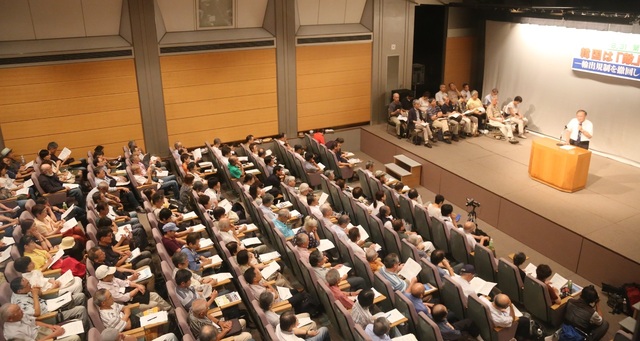Posted on : Sep.2,2019 18:29 KST
Modified on : Sep.2,2019 19:10 KST
 |
|
Japanese demonstrators rally an event titled “Is South Korea the Enemy?” at the Korean YMCA in Tokyo on Aug. 31. (Yonhap News)
|
As the Shinzo Abe administration in Japan continues exacting economic retribution against South Korea, a growing segment of conscientious Japanese citizens are calling for dialogue and a withdrawal of its export control measures. We look forward to seeing the Abe administration showing some respect for these courageous acts and changing its attitude.
On Aug. 31, around 350 Japanese attended an emergency rally titled “Is South Korea the Enemy?” at the Korean YMCA in Tokyo’s Chiyoda Ward. The event was organized by Japanese intellectuals who published a statement titled “Is South Korea the Enemy?” in late July and have been involved in a signature campaign. The crowd of citizens packed even the corridors of the venue; some reportedly had to go home because there was nowhere left to stand. Yuzo Itagaki, a professor emeritus at the University of Tokyo, described the Japanese government’s measures as “actions to punish South Korea while expressing [Tokyo’s] stance of refusing to reflect on the past,” and Japan as “the only one of the aggressor countries in the Second World War that has not engaged in any kind of reckoning.” Haruki Wada, also a professor emeritus at the University of Tokyo, warned that “Abe’s march toward policies of refusing dealings with South Korea marks the end of Japan as a peaceful stage.”
Even with the Japanese press scarcely reporting at all on the signature campaign, some 260,000 had visited the campaign’s website as of Aug. 30 amid growing word of mouth; around 9,300 had added their own signatures. One report quoted a citizen attending the rally as saying, “If you only look at opinion surveys commissioned by Japanese media, you would have the impression that the Japanese public supports Abe’s measures against South Korea, but there are a lot of people not speaking out who think these actions are not right.”
The same day, there was a demonstration in front of the offices of the Japanese private broadcaster CBC to demand the cancellation of a program where anti-Korean statements were made. During one of the network’s programs on Aug. 27, a Japanese professor mentioned the assault of a Japanese woman visiting South Korea by a South Korean man and said, “If South Korean women come here, Japanese men should assault them.” A citizen interviewed by the press said, “The content regarding South Korea on Japanese network programs is really bad, but this time I think they really crossed the line.”
Late last month, six attorneys affiliated with the Japan Federation of Bar Associations human rights committee published a book titled “The Conscripted Worker Trial and the Japan-Korea Claims Settlement Agreement: Reading and Unpacking the South Korean Supreme Court Ruling.” Attorney Seita Yamamoto explained that the book was written to share the truth that the Japanese government and media were not mentioning.
“Most Japanese people believe the conflict between South Korea and Japan is something that South Korea started after the Supreme Court decision, but the Japanese government actually appears to have instigated it to drum up its support ratings,” Yamamoto said.
He also stressed that compensation of the forced labor conscription victims is “not a political matter for two countries to fight over, but a human rights issue involving victims who have been battling in court for 25 years.”
Two months after initiating its export controls, the Abe administration just keeps parroting the same incoherent claims. It needs to stop doing foolish things that threaten to do irretrievable damage to bilateral relations, and focus instead on what these conscientious citizens are saying. Their advice may offer some ideas for resolving the situation.
Please direct comments or questions to [english@hani.co.kr]






